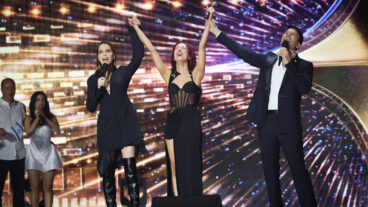‘Beautifeel shoes are produced by craftsmen for discerning women who care about appearance’ – Ami Bar-Nahor.If you keep your eye to the ground on the streets and office buildings of the United States, you’re bound to find something Israeli. Shoes that is. Because over the last decade, Beautifeel – an Israeli produced line of women’s shoes – has become a household brand name throughout North America.
While having earned a reputation for cushioning, support, shock absorbency and flexibility, Beautifeel shoes belong to the fashion market according to Ami Bar-Nahor, president of is manufacturer – Onyx Footwear Industries Ltd.
“The shoes are produced by craftsmen for discerning women who care about appearance,” he told ISRAEL21c during a visit to the Rishon Lezion manufacturing plant.
Industrial scale shoemaking in Israel dates back to the 1950s, when immigrants from north Africa set up dozens of small workshops, saturating a tiny but growing local market with functional, inexpensive footwear. Production shrunk as Israel’s economy opened to European imports in the 1980s, and much of the trained workforce left the field. But the wave of immigration from the former Soviet Union in the late eighties and nineties brought a new generation of skilled shoemakers to Israel.
“They arrived young and hungry from all over the FSU with diplomas in shoe design, development and production. Some started working within a week of landing in Israel,” said Bar-Nahor.
He noted that no degree courses are offered by Israeli academic institutions, although Jerusalem’s Bezalel art school and the Shenkar design school in Ramat Gan hold classes in shoe design.
Onyx’s modern, 35,000 square foot red-bricked factory in Rishon Lezion has a quiet, workmanlike atmosphere. Russian is the shop floor lingua franca as a workforce of almost 200 people meticulously hand produce every shoe, using high quality Italian calf leathers and latex soles. The entire process, from design to packing, is handled at the factory.
“We hold bilingual company meetings. I’ve learned some Russian, but most employees know Hebrew well enough to communicate. Employees don’t leave the company once they start,” said Bar-Nahor.
A Tel Aviv University business management graduate, Bar-Nahor, 52, entered the footwear business in the early eighties as a marketing consultant. One of his clients was the struggling shoe factory of kibbutz Naot Mordechai, near the Lebanese border.
“I was behind the brand name ‘Teva’ [Hebrew for ‘nature’],” said Bar-Nahor, who eventually became the company’s marketing manager for four years.
With its trademark conservatively stylish sandals and outdoor shoes, Teva Naot became an international success story in the eighties and now exports to 15 countries, including France, Germany, Greece, Cyprus, the Czech Republic, Australia, Singapore, New Zealand, South Korea and the U.S., including Alaska.
“Without intending it, I became a shoemaker,” Bar-Nahor said. He established Onyx in 1990, taking over a failed 100 square meter shoe factory in rundown south Tel Aviv and starting with five employees.
“I’m more a marketing person than a production person. I didn’t know whether the name ‘Beautifeel’ would penetrate, so I sent pretty students to interview tourists at Ben Gurion airport. When asked what the name implies, 70 percent answered ‘cosmetics’. After they were informed that Beautifeel is a shoe brand, the vast majority described the product as ‘comfortable’ and ‘feminine’. I knew I had a million dollar name,” he said.
From the outset, he aimed at a specific niche market. “I took the Fifth Avenue city girl in work clothes and sneakers, carrying her elegant office shoes in a bag. Women around 30, who have babies or follow careers, demand comfort. Comfortable shoes don’t have to be unattractive, and functionalism doesn’t mean not looking good,” he said, adding that a late 1970s rend of comfort and functionality in shoe design lingered into the Nineties.
“Not so long ago, most ‘comfortable shoes’ had a flat bottom and casual-looking design. Women who appreciated well-fitting, comfortable shoes were forced to compromise beauty for the sake of comfort. Nowadays, the public is hungry for comfort that looks elegant, and this trend will grow in the coming years,” said Bar-Nahor.
“It’s not easy to produce a shoe that is both comfortable and fashionable. Using modern technology, we can close the gap without compromising either – for example, a shock-absorbing filling allows a woman to wear high heels without feeling pressure in her toes or ankles.”
Having honed his concept of ‘Dressy Comfort’, Bar-Nahor took a wide range of shoes and sandals with various heel heights, designs and colors to U.S. trade shows, and began to penetrate the North American market in the early nineties.
“In the U.S., there’s a segment of the market known as ‘comfort stores’. You won’t find them anywhere else. Europe has ladies’ stores that are all about fashion, and family shoe stores. There’s no comfort store category,” he said.
Marketed and distributed by Beautifeel USA based in Chestwood, California, the shoes are now sold in 90 percent of comfort stores in the U.S. The company’s market share in Europe is rising steadily, while distribution in Japan is just beginning. Bar-Nahor is spending much of this summer in Tokyo, exploring ways into another potentially lucrative market.
Retailing at about $180, the hand-made shoes are designed to last. “The woman of the future is choosy. She demands comfort, and is willing to pay for it,” said Bar-Nahor.
Israel Radio reported last month that U.S. First Lady Laura Bush recently bought two pairs of Beautifeel shoes, but ISRAEL21c was unable to confirm the reports. However, don’t be surprised if all eyes will be on the First Lady’s feet when the Republican Convention convenes this week.












